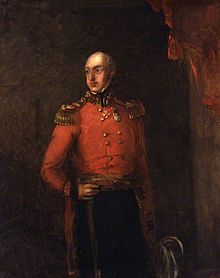William George Keith Elphinstone
William George Keith Elphinstone CB (* 1782 ; † April 23, 1842 with Tezeen in Afghanistan) was a British major general and led the loss-making retreat of the British from Kabul in the First Anglo-Afghan War .
Life
Elphinstone was the son of the director of the British East India Company William Fullerton Elphinstone and nephew of George Elphinstone, 1st Viscount Keith . He joined the British Army as a lieutenant in 1804 . In the same year he was promoted to first lieutenant . In 1806 he had already achieved the rank of captain , in 1811 that of major . In 1813 he bought the post of lieutenant colonel and served under Thomas Graham in the Netherlands , where he fought in the Battle of Waterloo . For his performance in battle, he was accepted as a Companion in the Order of the Bath , made a Knight in the Military Wilhelms Order and received the Russian Order of Saint Anne .
1815-18 he commanded his regiment during the occupation of France . On May 27, 1825 he was promoted to colonel and he became adjutant to King George IV. On May 10, 1837, he received the rank of major general . In 1839 he took command of the Benares division from Willoughby Cotton in India .
In the First Anglo-Afghan War , the ruler of Afghanistan Dost Mohammed was driven out by the British in 1839/40 and Shodja Shah Durrani was installed in his place. Most of the British troops were then withdrawn from Afghanistan . In the spring of 1841 Elphinstone took over command in Kabul from Commander-in-Chief Cotton to support Shodja and the British resident William Macnaghten . Elphinstone reached Kabul in April and stayed there with the remaining of the original three divisions.
The situation in Kabul appeared calm, and Elphinstone failed to maintain discipline and place the division, far from any support, in appropriate defensive positions. In addition, Elphinstone's health was very poor due to a gout disease and he left the daily work to his subordinates.
At the beginning of November 1841 an uprising against the British occupation began. At Christmas 1841 Macnaghten was murdered by Afghans who also cut ties between Kabul and India . The British division was now encircled and practically under siege. On January 1, 1842, Elphinstone signed a contract granting him the trigger. In return, he handed over some of his weapons and supplies.
On January 6, 1842, Elphinstone began withdrawing from Kabul. The goal was to reach the next garrison in Jalalabad , about 140 kilometers away. A total of 17,000 people were in the train. They were attacked as soon as they left the garrison. The attacks continue and the promised escort did not appear. Several negotiations took place along the way and more hostages were left behind, including Elphinstone himself on January 11th. In the days that followed, the army at the Chaiber Pass was completely destroyed. Ultimately, only the British military doctor Dr. William Brydon , arriving in Jalalabad on the afternoon of January 13th. On April 23, 1842, Elphinstone died in captivity of dysentery . His body was brought across the river to Jalalabad and buried there.
literature
- Leslie Stephen (Ed.): Dictionary of National Biography. Volume 17. London 1889
- Saul David: The Greatest Failures in Military History , 2003, ISBN 3-453-86127-2 (covers, among other things, the retreat from Kabul in 1842)
| personal data | |
|---|---|
| SURNAME | Elphinstone, William George Keith |
| BRIEF DESCRIPTION | British Army Officer |
| DATE OF BIRTH | 1782 |
| DATE OF DEATH | April 23, 1842 |
| Place of death | near Tezeen , Afghanistan |
